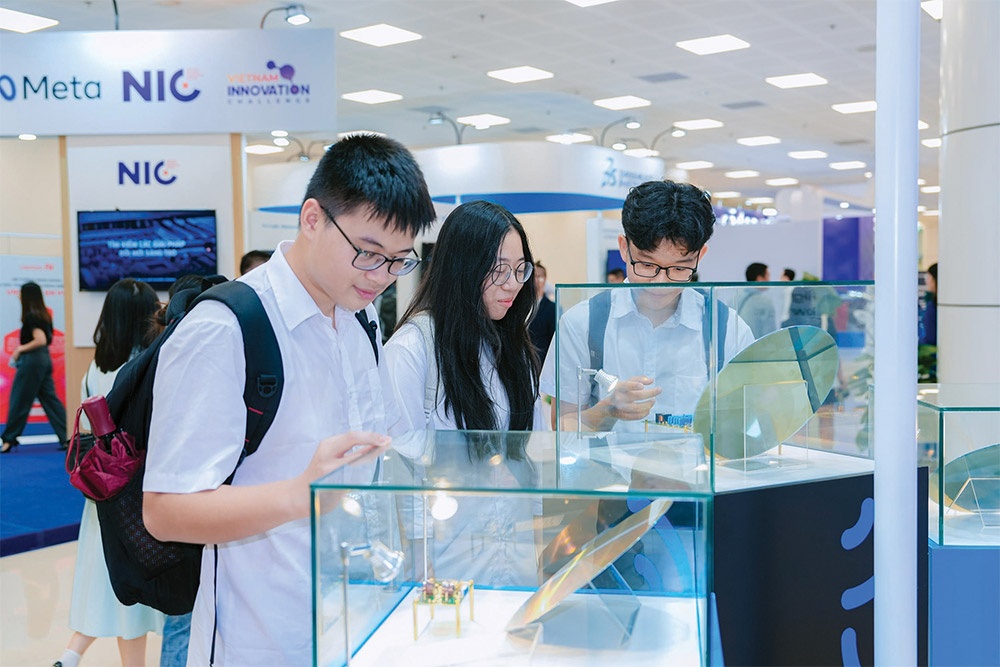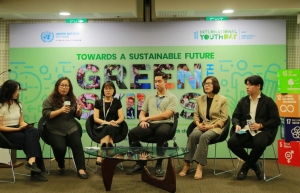Green skills training support on hand for Vietnam’s workers
 |
| Vietnamese personnel are being supported through collaboration with universities and research institutes |
In late September, a delegation of 17 Australian educational institutions and organisations visited Vietnam to explore cooperation in areas where Australia excels, such as agriculture, energy transition, and manufacturing.
Binh Nguyen, manager of Strategy and Partnerships for Southeast Asia at the University of Queensland, expressed a desire to establish partnerships with various educational institutions in Vietnam following the visit.
“We can support Vietnam’s green transition through training and research collaborations with key universities and research institutes in Queensland. This includes short-term programmes to enhance the green skills of senior officials,” Nguyen said.
Rebecca Ball, senior trade and investment commissioner at Austrade, said, “Australia’s expertise in green technologies, sustainable practices, and clean energy solutions will play a crucial role in supporting Vietnam’s workforce development and green economy transition.”
The country’s general strategy aims for net-zero emissions by 2050, focusing on reducing greenhouse gases, increasing the use of renewable energy, and promoting sustainable urban development. According to the Ministry of Labour, Invalids and Social Affairs, the transition is expected to create nearly one million new jobs by 2040.
The General Statistics Office (GSO) reported that green jobs currently account for 3.6 per cent of total employment in Vietnam. Sectors such as electricity, gas, and water supply have the highest concentration of green jobs, at about 23 per cent, while mining and market services account for 5 per cent each.
The GSO also forecasts that the green economy will create around 90 new occupations, doubling the current number and comprising over 40 per cent of total employment. The Red River Delta, Mekong Delta, North Central, and Central Coastal regions are expected to have the highest concentration of green jobs.
Globally, the transition to a green economy and net-zero commitments have led to rising demand for related jobs. According to the Greening World of Work 2023 Outlook report by Manpower Group, approximately 30 million new jobs will be created globally by 2030 due to such development. However, 91 per cent of companies in the Asia-Pacific region are facing a shortage of skilled personnel for the transition.
The 2023 Global Green Skills Report by LinkedIn reveals that demand for workers with such skills is increasing, but the market faces a shortage of capable labour. Between 2022 and 2023, the recruitment rate for workers with at least one green skill doubled to 22.4 per cent, while workers with such skills accounted for only 12.3 per cent of the workforce.
In response, several Vietnamese universities have begun integrating these skills into their curricula to address the workforce demands of this transition.
Dong Van Ngoc, principal of Hanoi College of Electro-Mechanics said, “Green skills training programmes will be incorporated into our courses, with priority given to renewable energy, wind and solar energy, automation, and 4.0 technology in agriculture.”
Similarly, the School of Electrical Engineering at Hanoi University of Science and Technology is enhancing its programme in Electrical Systems and Renewable Energy to be at the forefront of the green transition.
Assoc. Prof. Nguyen Duc Huy, deputy principal of the school, said, “Large companies such as Vietnam Electricity and foreign firms from Japan are collaborating with the university in training processes. Partnerships between businesses and training institutions are crucial, and this collaboration will create balanced development and play a crucial role in promoting sustainable growth in people. Our vision is to train high-quality personnel, not just for Vietnam, but to supply the world.”
| Tran Nam Tu, general director Department of Science, Technology, and Environment Ministry of Education and Training In the current university education system, it is necessary to conduct statistical research on how many institutions have the conditions to implement innovation in education, and which institutions have the conditions but do not implement innovation. From that, we will have a comprehensive, multidimensional view of innovation in universities today, contributing to appropriate policy adjustments and supplements. In the near future, the Ministry of Education and Training will also issue projects on training human resources for high-tech development towards 2035 and developing high-quality personnel for Industry 4.0. These aim to especially source experts in AI and semiconductors, to become Vietnam’s competitive advantage in attracting investment from large technology corporations, contributing to the economic restructuring and sustainable development of the country based on sci-tech and innovation, digital transformation, and green transformation. The number of jobs requiring high-quality labour is increasing, creating different job markets with high skills or low skills, leading to increased differentiation, or creating entirely new jobs. So it is necessary to proactively prepare in training people, vocational education to meet market needs. Human resource development policies must both expand the scale, diversity types, improve the quality of training, and create good working conditions and environments to effectively use trained workers. Universities need to redesign programmes, innovate teaching and learning methods, improve the soft skills of students, and create links between schools and businesses, all while improving the quality of technology incubators. Such moves aim to meet the requirements of deep and sustainable integration, improving the position of Vietnam’s innovation globally. Renee Deschamps, minister and deputy head, Mission, Australian Embassy Vietnam Our strong education ties with Vietnam are demonstrated at both government and institutional levels. Starting with our bilateral scholarship programme, the relationship in the education sector has rapidly developed in terms of both depth and breadth. This includes significant student mobility from Vietnam to Australia, with 37,000 Vietnamese students enrolled in Australian institutions – and an increasing number of students undertaking an Australian qualification in Vietnam – with more than 15,000 students currently studying here. What is more, an increasing number of Australian institutions have been delivering programmes locally in Vietnam and engaging in research collaborations with institutions. As Vietnam strives to achieve its ambitious net-zero emissions target by 2050, Australia’s expertise in green technologies, sustainable practices, and clean energy solutions will play a crucial role in supporting the country’s workforce development and green economy transition. Our institutions, recognised globally for sustainability plans, stand ready to contribute to Vietnam’s decarbonisation efforts and future economic growth. Ranked 11th globally for sustainability programmes, Australian institutions are at the forefront of research and innovation in green tech. Its leadership in hydrogen exportation, lithium production, and clean energy further underscores its role in providing the knowledge and tools needed for a successful transition. Australia’s education, skills, and training capabilities are pivotal in supporting Vietnam’s journey towards achieving net-zero emissions. With a strong history of collaboration in education, it offers extensive experience and expertise in green economy and sustainable practices. The presence of so many leaders and officials from government agencies, academia and businesses demonstrates the shared interests in advancing the green economy in Vietnam. Tristanne Scott-Durairajah, associate director Partnerships and Learning Abroad University of Tasmania Tasmania is known for being a clean, green, pristine, natural environment, and yet the industries that form our community are not necessarily sustainable industries. Our economy is fuelled by mining, energy, agriculture, and aquaculture. We have some services in tourism and education, and so it really has been a whole community approach to maintaining and commitment to sustainability. We have started with focusing on decarbonising our energy systems. Tasmania is very proud to run 100 per cent on renewable energies, and the university has been locked up with our community around the commitment to sustainability and to achieve net-zero. Tasmania is a net-zero community, and as a university, we have been certified carbon-neutral. Since 2016 we have entirely divested from all fossil fuels, and sustainability is gathered through all of our teaching, research, operations and our community engagement. We’re very proud to rank number one globally in times of higher education impact mechanisms for climate action. At the Tasmanian Institute of Agriculture, we’re set up to offer courses that recognised Master’s and PhDs in agricultural sciences. But one of the challenges of upskilling the agricultural sector is that a lot of highly skilled workers are not degree qualified, and they’re not traditionally university students. So we really have to think about the kind of courses and training that we provide, which includes a range of degree qualifications. |
 | 'Green skills vital' for green transition Organised by the United Nations in Vietnam on August 11, this year’s International Youth Day focussed on the role of education and highlighted the importance of teaching green skills to young people, so they can move towards a brighter, greener, and more sustainable future for Vietnam. |
What the stars mean:
★ Poor ★ ★ Promising ★★★ Good ★★★★ Very good ★★★★★ Exceptional
Related Contents
Latest News
More News
- Internal strengths attest to commitment to progress (February 19, 2026 | 20:13)
- Vietnam, New Zealand seek level-up in ties (February 19, 2026 | 18:06)
- Untapped potential in relations with Indonesia (February 19, 2026 | 17:56)
- German strengths match Vietnamese aspirations (February 19, 2026 | 17:40)
- Kim Long Motor and AOJ Suzhou enter strategic partnership (February 16, 2026 | 13:27)
- Haiphong welcomes long-term Euro investment (February 16, 2026 | 11:31)
- VIFC in Ho Chi Minh City officially launches (February 12, 2026 | 09:00)
- Norfund invests $4 million in Vietnam plastics recycling (February 11, 2026 | 11:51)
- Marico buys 75 per cent of Vietnam skincare startup Skinetiq (February 10, 2026 | 14:44)
- SCIC general director meets with Oman Investment Authority (February 10, 2026 | 14:14)

 Tag:
Tag:
















 Mobile Version
Mobile Version